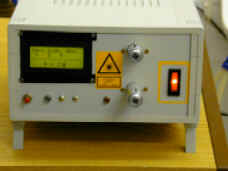The
invention
- The
problem to be solved:
Measurement of chemical compounds in
different environmental conditions
|
- Definition:
Fibre optic photometer module
with diode laser light source and
semiconductor-based light absorbance
measurement system. The analytical curve
of the analyte, the parameters of the
investigation and the condition variables
are downloaded into microcontroller by a
host computer. Several special sensing
heads can be attached to the device to
measure different compounds.
|
- Presentation:
The device is mounted in 220 V
powered, standard IP 65 house. PIC16 type
microcontroller is applied to control the
laser light source, to store the
downloaded analytical curve, to calculate
the results and to drive the liquid
crystal display. The information can be
transferred to the microcontroller by
serial port of an IBM compatible PC. The
device can be disconnected after
downloading and can be used without PC.
Optional possibility is ready to transfer
the measured values back to the PC by
serial port of the sensing device. The
fibre optic cable of the laser and the
detector can be attached in front of the
system. The core of the fibre is high
purity grade optical glass, the bundle is
made from chemical resistive plastic. The
end of the fibres are connected to the
sensor head. This head contains a plate
covered by sensing material. The cover
consists of special compounds that absorb
the laser light and could change colour
depends on the concentration of the
investigated analyte. The sensing
compound could react with the analyte by
chemical, physical and biological
interactions. The light source is a diode
laser with 20 mW output power and 635 nm
wavelength. The measurement of light is
performed by a high surface area silicium
semiconductor detector. The proper
temperature of the laser is supported by
passive cooler. The coupling of the light
signal is made by chemically resistive
sapphire ball lenses. The laser is turned
on by the microcontroller during the
measurements. The sampling time is 1
second. After measurement of signal, the
laser is turned off, and the background
is measured. The absolute signal is
calculated by microcontroller. This
signal is proportional to the
concentration of the analyte. Several
parallel measurements are made. Immersing
the sensor head into the gas or liquid
stream, after the measurement the proper
concentration value is displayed on the
liquid crystal screen. The sensing head
can be changed by using a simple fast -
lock optical connector. The new
parameters can be downloaded within
several seconds. After it the device is
ready to investigate a new compound in a
new media.

The
fibre optic detector module
|
- Application:
Measurment of
chemical compounds
|
- Advantages:
Several different analytical curves and
parameters can be stored by the host
computer. Microcontroller device is
flexible enough to handle the signals of
different sensing modules and to
calculate the results from environmental
measurements. Application of modular
system is very advantageous for
investigation of more analytes in
environmental on-field operations.
|
- Stage
of development: Prototype of the
device is ready. Sensor module for
measurement of air humidity is ready. Sensor head for measurement
of aromatic hydrocarbons is under
development
|
- Documentation
available: Yes
|
The
inventor(s)
- Name(s):
Dr. György BARKÓ and Dr. József Hlavay
- Self
introduction:
Dr. György Barkó:
Bs.
(Mechanical Engineering, 1990), Ms.
(Chemical Engineering, 1992), Ph.D. (Environmental
Sciences, 1997)
Dr. József Hlavay:
Ms.
(Chemical Engineering, 1971), Ph.D.
(Chemical Engineering, 1985), D.Sc. (Chemical Engineering,
1993)
|
The
protection
- Form:
Patent pending application,
Utility model pending application
- Priority:
- Countries
where it is force:
|
Business
intention:
|
Contact
- Name:
Dr. György Barkó, University of Veszprém
- E-mail:
barkogy@almos.vein.hu
- Fax: +3688 - 423203
- Phone: +3688 - 422022 / 4698,
+3620 - 9807627
- Address:
H-8201 P.O.B. 158. Veszprém, Hungary
|